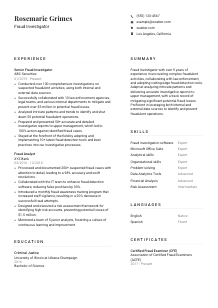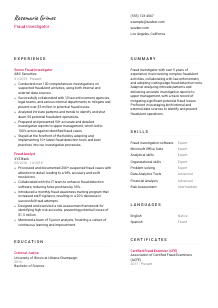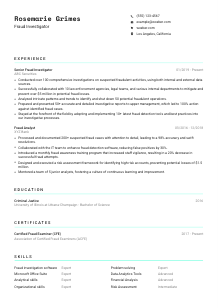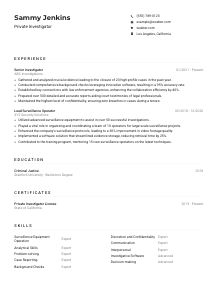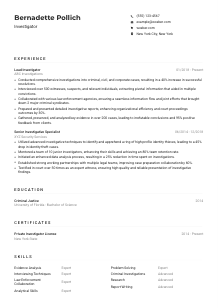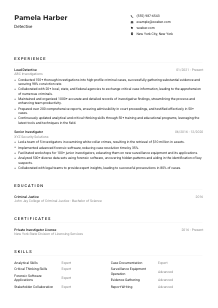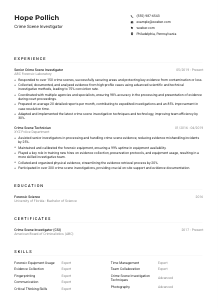Fraud Investigator Resume Example
Diving into deceptions, but your resume feels like a scam? Browse this Fraud Investigator resume example, pieced together using Wozber free resume builder. Uncover how you can spotlight your investigative skills to match job expectations, ensuring your career story stays true and fraud-free!
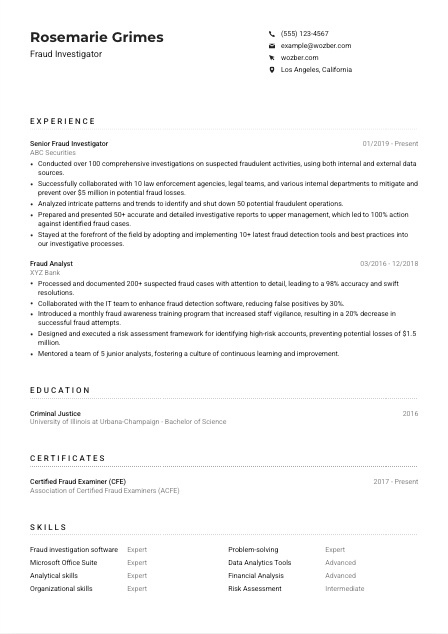
How to write a Fraud Investigator resume?
Hello, aspiring Fraud Investigator! If you're looking to carve out a successful path in the realm of fraud investigation, your resume isn't just a document; it's your golden ticket. In a field where precision, analytical prowess, and a keen eye for detail are paramount, your resume must reflect your mastery and dedication. Utilizing the intuitive Wozber free resume builder, this guide is meticulously crafted to help you create a resume that not only meets but exceeds the demands of your dream role.
Prepare to transform your credentials into a compelling narrative that not only passes through Applicant Tracking Systems (ATS) with ease but lands you the interview for a Fraud Investigator position. Let's activate your career launch sequence!
Personal Details
The 'Personal Details' component of your resume might appear rudimentary at first glance, but it's the initial handshake with your potential employer. Crafting it with a Fraud Investigator's precision can set a strong foundational tone for the rest of your resume. Let's decrypt how you can optimize this section, aligning it perfectly with the Fraud Investigator role's essentials.
1. Identify Yourself with Clarity
Your name is essentially your personal brand. Ensure it's prominent, adopting a clear, ATS-friendly font. A touch larger typography for your name than the rest of your resume can make it stand out, subtly signaling your attention to detail - a must-have trait for a Fraud Investigator.
2. Pin the Title
"Fraud Investigator" should appear right below your name, crafting an immediate connection between you and the job you're targeting. It's a strategic move to position yourself as the ideal candidate from the get-go, showcasing alignment with the role even before delving into the depths of your resume.
3. Prove Your Accessibility
List your contact number and a professional email address (think: firstname.lastname@email.com) to ensure seamless communication. Triple-check for typos; a Fraud Investigator knows the devil's in the details, and so does a discerning hiring manager.
4. Geographical Alignment
Since the job description underscores Los Angeles, California as a crucial locale, stating this as your location or willingness to relocate preemptively addresses one potential concern of the hiring manager. It's your way of showing commitment and readiness for the role.
5. A Sleek Introductory Profile
Consider adding a link to a professional profile or personal website if applicable. For a Fraud Investigator, showcasing a digital footprint that aligns with your profession can be a plus, offering a deeper dive into your career narrative and accomplishments.
Takeaway
The 'Personal Details' section is more than administrative fluff; it's your first opportunity to align with the Fraud Investigator position's nuances. From your name's presentation to your professional online presence, each element should harmonize to cast a promising first impression. Keep it refined, relevant, and demonstrative of your keen eye for critical specifics.





Experience
In the competitive world of fraud investigation, shining a spotlight on your professional journey is paramount. The 'Experience' section is your arena to demonstrate just how uniquely suited you are for the Fraud Investigator role. Delve into an artful narration of your career milestones, emphasizing the skills and achievements that echo the job description.
- Conducted over 100 comprehensive investigations on suspected fraudulent activities, using both internal and external data sources.
- Successfully collaborated with 10 law enforcement agencies, legal teams, and various internal departments to mitigate and prevent over $5 million in potential fraud losses.
- Analyzed intricate patterns and trends to identify and shut down 50 potential fraudulent operations.
- Prepared and presented 50+ accurate and detailed investigative reports to upper management, which led to 100% action against identified fraud cases.
- Stayed at the forefront of the field by adopting and implementing 10+ latest fraud detection tools and best practices into our investigative processes.
- Processed and documented 200+ suspected fraud cases with attention to detail, leading to a 98% accuracy and swift resolutions.
- Collaborated with the IT team to enhance fraud detection software, reducing false positives by 30%.
- Introduced a monthly fraud awareness training program that increased staff vigilance, resulting in a 20% decrease in successful fraud attempts.
- Designed and executed a risk assessment framework for identifying high‑risk accounts, preventing potential losses of $1.5 million.
- Mentored a team of 5 junior analysts, fostering a culture of continuous learning and improvement.
1. Dissect the Requirements
Start by deconstructing the job description. For instance, it highlights "conduct comprehensive investigations" and "collaborate with law enforcement." Your experience entries should mirror these demands, creating a bridge between what you've accomplished and what's expected in the role.
2. Articulate Roles and Realms
Present your professional narrative in reverse-chronological order, spotlighting your most recent role first. Each entry should include your title, employer, and the tenure. This format is not just ATS-compliant but also allows recruiters to trace your growth trajectory easily.
3. Sculpt Success Stories
Hone in on accomplishments that resonate with the role's requisites. For instance, explain how you "Conducted over 100 comprehensive investigations..." or "Successfully collaborated with 10 law enforcement agencies..." These instances directly address key responsibilities and show quantifiable results, a testament to your expertise.
4. The Power of Precision
Inject your accomplishments with numbers where possible. Quantifying your impact, be it through the number of cases resolved or the amount in fraud losses prevented, lends credibility and scale to your achievements, showcasing the substantial value you bring.
5. Relevance Reigns Supreme
In the expansive sea of your experiences, anchor down on those directly pertinent to the job at hand. Extraneous details, while possibly interesting, can detract from the narrative's focus. Every bullet point should serve the sole purpose of strengthening your candidacy for the Fraud Investigator position.
Takeaway
Your 'Experience' section is a cornerstone of your resume, each entry a stepping stone towards securing the Fraud Investigator role. It's your platform to showcase not just what you've achieved but how those achievements align with the potential employer's expectations. Tailor it meticulously, emphasize your impact with numbers, and ensure relevance, showcasing yourself as the prime candidate the employer can't afford to overlook.
Education
A cogent 'Education' section establishes the academic foundation supporting your career achievements. For a Fraud Investigator, showcasing relevant educational credentials can significantly bolster your resume's strength. Here's how to strategically frame your educational background in alignment with the job's demands.
1. Decode the Educational Essentials
First, extract the core educational requirement from the job description, such as a "Bachelor's degree in Criminal Justice." This explicit mention should guide how you list your degree, ensuring it matches what the role specifically seeks.
2. Keep It Structured and Straightforward
Present your academic credentials in a clean, ATS-compliant manner. Begin with your degree and field of study, followed by the institution name and graduation year. This clear structure aids in easy navigation and comprehension, letting your qualifications shine.
3. Align Your Academic Achievements
When your degree directly aligns with the job's requirements, you're already a step ahead. Highlighting a "Bachelor of Science in Criminal Justice," as in our example, underscores your fundamental suitability for the role. It's not just about having a degree; it's about having the right one.
4. Supplement with Significant Coursework
If your journey to becoming a Fraud Investigator included coursework that provided a deeper dive into fraud investigation, risk assessment, or legal frameworks, do mention these. Especially relevant for recent graduates or those making a career pivot, such specifics can demonstrate your preparedness for the role.
5. Acknowledge Additional Accolades
Any academic honors, relevant extracurriculars, or substantive projects that mirror the job's nature can add depth to your profile. Such distinctions, while not the focal point for seasoned professionals, can offer insights into your early promise and continued relevance in the field.
Takeaway
The 'Education' section offers more than a glimpse into your academic background; it serves as proof of your foundational knowledge and commitment to the field of fraud investigation. Tailor it to reflect the job's necessities, leveraging your academic history as another pillar supporting your candidacy. Remember, each element of your resume, including your education, should collectively narrate the story of your qualifications and readiness for the role.
Certificates
For a Fraud Investigator, certifications aren't just accolades; they're a testament to your specialized knowledge and commitment to professional development. The right certificate can significantly elevate your candidacy. Let's explore the influential role of certifications and how to spotlight them effectively.
1. Laser-Focus on Required Certifications
The job description mentions, "Certification in Certified Fraud Examiner (CFE)" as a crucial or desirable credential. If you possess this certification, it's imperative to list it prominently. It directly correlates with the job's expectations, showcasing your specialization and dedication.
2. The Significance of Seleczion
Prioritize listing certifications that directly align with the responsibilities and expectations of the Fraud Investigator role. This strategic selection ensures that hiring managers immediately recognize your fit and expertise for the position, without wading through unrelated achievements.
3. Timeliness and Transparency
For certifications, especially in fields that are ever-evolving like fraud investigation, the date of achievement can be telling. It showcases your continuous effort to stay at the forefront of industry standards and technological advancements, reflecting your proactive stance on professional growth.
4. Commit to Continual Learning
The world of fraud investigation is dynamic, with new techniques and tools constantly emerging. Your commitment to updating your certifications and pursuing ongoing education speaks volumes about your adaptability and eagerness to maintain a cutting-edge skill set.
Takeaway
In a world rife with challenges and advancements, your certifications are your armor. They not only validate your expertise but also demonstrate your zeal for staying updated and relevant. Highlight certifications with direct relevance to the Fraud Investigator role to solidify your candidacy and underscore your readiness to tackle the complexities of the profession head-on.
Skills
In a Fraud Investigator's toolkit, certain skills are indispensable. Your 'Skills' section is where you can concisely display your professional strengths. Let's delve into how to frame this segment to communicate your prowess and preparedness for the challenges of fraud investigation.
1. Extract and Match
Methodically sift through the job description, extracting skills that are explicitly requested or implicitly implied. This fuels your ability to match and list skills like "fraud investigation software," "Microsoft Office Suite," and "analytical skills," directly aligning with the employer's checklist.
2. Prioritize and Polish
Highlighting your competencies demands more than just enumeration; it requires prioritization. Focus on listing skills that best showcase your fit for the role. Ensure that each skill listed is polished through practical application and experience, as evidenced in your 'Experience' section.
3. Maintain Sleek Organization
While you might be tempted to showcase the breadth of your skill set, restraint and relevance are key. An ATS-compliant resume benefits from a neatly organized 'Skills' section, where each listed skill resonates with the specifics of the Fraud Investigator role, making for a compelling argument in your favor.
Takeaway
Your 'Skills' section is a concise compendium of your professional capabilities. It's not just a list; it's a narrative that speaks to your readiness and alignment with the role of a Fraud Investigator. Each skill is a beacon, signaling your preparedness to excel in the challenges that lie ahead. Approach this section as both a showcase and a promise, ensuring that it reflects the most relevant and refined aspects of your professional repertoire.
Languages
Your ability to navigate multiple languages can be a significant asset in the nuanced field of fraud investigation. Whether dealing with international cases or diverse teams, linguistic skills can open doors to deeper understanding and more effective communication. Let's explore how to adeptly present your language proficiencies.
1. Assess the Application
Begin by reviewing any specific language requirements or preferences stated in the job description. For a Fraud Investigator, the ability to "function effectively in an English-speaking environment" is explicitly stated, prioritizing English proficiency at the top of your list.
2. Elevate Essential Languages
If the role explicitly mentions a language, such as English for a Fraud Investigator, ensure your proficiency level is clearly stated. This not only meets a basic requirement but also establishes a fundamental competency critical to the role.
3. Catalogue Complementary Languages
Beyond the primary language requirement, listing additional languages you're proficient in can enhance your resume. It demonstrates your capability to engage in diverse environments and handle tasks that may require multilingual communication, adding another layer to your candidacy.
4. Clarity in Proficiency
It's vital to accurately depict your language skills. Whether you're "Native," "Fluent," "Intermediate," or "Basic," these descriptors provide a clear gauge of your linguistic capability, allowing hiring managers to assess your fit for roles that may require specific language proficiencies.
5. Role's Linguistic Scope
Consider the broader scope of the Fraud Investigator role. If it involves international cases or interacting with non-English speakers, your multilingual abilities can significantly bolster your appeal to potential employers, showcasing an edge in communication and cultural understanding.
Takeaway
Your language skills are more than just a list at the bottom of your resume; they're a testament to your ability to navigate the global dynamics of fraud investigation. They signify your readiness to engage, communicate, and solve complex issues in a multilingual world. Highlighting your linguistic abilities can distinguish you as a versatile and valuable candidate, ready to take on the demands of the role with linguistic finesse and cultural acuity.
Summary
The 'Summary' section is your resume's headline act, a concise encapsulation of your professional essence. For a Fraud Investigator, this segment is your chance to immediately demonstrate your alignment with the role, showcasing not just your skills but your professional narrative. Let's craft a summary that sets you apart.
1. Grasp the Job's Core
Begin with a deep dive into the job posting, understanding the essence of what makes a successful Fraud Investigator. It's about melding this understanding with your own professional story, presenting a match that seems undeniable to the hiring manager.
2. Craft a Captivating Opening
Initiate with a dynamic opening line that succinctly presents your professional identity. Mentioning that you're "a Fraud Investigator with over 5 years of experience" not only establishes your experience level but instantly ties your identity to the role in question.
3. Highlight Your Hallmarks
In a few powerful bullet points or a short paragraph, elucidate your key achievements, skills, and traits that directly echo the job requirements. It's about cherry-picking those elements of your career that most vividly reflect your eligibility and excellence for the role at hand.
4. Precision and Brevity
The beauty of the 'Summary' lies in its brevity and punch. This isn't the place for exhaustive details but rather a teaser that beckons a closer look. Aim for a crisp, engaging summary that encapsulates your fit for the Fraud Investigator role, enticing the hiring manager to delve deeper into your resume.
Takeaway
The 'Summary' is your resume's handshake, offering a first glimpse of your professional caliber and alignment with the Fraud Investigator role. By interweaving your career highlights with the role's demands, you craft a compelling prelude to your professional narrative. Let this section serve as a testament to your readiness, inviting the hiring manager on a journey through your career achievements. Tailor it with care, and let it resonate with confidence and precision.
Launching Your Fraud Investigator Journey
Kudos for embarking on this deep dive into crafting your ideal Fraud Investigator resume. Armed with these targeted insights, you're now equipped to build a resume that doesn't just navigate ATS systems seamlessly but speaks directly to the heart of what hiring managers seek. Your resume is the narrative of your professional journey, poised to tell a story of expertise, dedication, and the perfect fit for the role you're aspiring to. Lean into the power of the Wozber free resume builder, with free ATS-friendly resume templates for design and ATS resume scanner for keyword optimization, to ensure your resume is not just seen but celebrated. The next chapter of your career awaits.
It's time to investigate your own success, craft your story with precision, and step confidently into the role of a lifetime. The investigative world is ready for your insight, expertise, and impact. Let's get started!

- Bachelor's degree in Criminal Justice, Finance, or related field.
- Minimum of 3 years of experience in fraud detection, investigation, or equivalent field.
- Proficiency with fraud investigation software, data analytics tools, and Microsoft Office Suite.
- Strong analytical, organizational, and problem-solving skills.
- Certification in Certified Fraud Examiner (CFE) or willingness to obtain within the first year of employment.
- Must be able to function effectively in an English-speaking environment.
- Must be located in or willing to relocate to Los Angeles, California.
- Conduct comprehensive investigations on suspected fraudulent activities, using both internal and external data sources.
- Collaborate with law enforcement agencies, legal teams, and internal departments to mitigate and prevent fraud.
- Analyze patterns and trends to identify potential fraudulent operations or weaknesses in current systems.
- Prepare accurate and detailed investigative reports, and present findings to management and stakeholders.
- Stay updated with the latest fraud detection tools, techniques, and industry best practices to ensure current investigative processes are relevant and effective.





